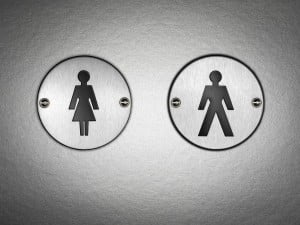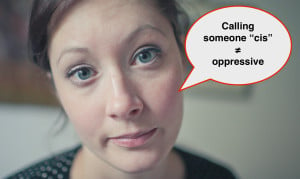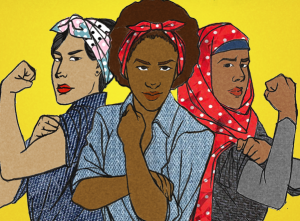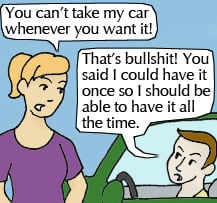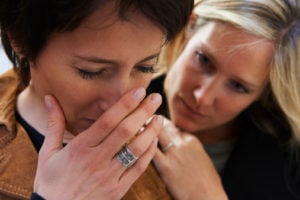
Two people hugging
We all know that one person who you and your friends no longer ask about, a persona non grata within social justice.
For the purposes of this article, let’s refer to her as G. She’s just one of the many people who have been excommunicated from social justice activism by way of social media call outs.
For G, whose name has been withheld, the call outs never end. G said in an interview: “The intent of my call out is very explicitly to compel to kill myself. I didn’t make a mistake, I don’t need training, I don’t need mediation, I am a monster.”
Starting three years ago, G was called out for supposedly anti-social and harmful behavior. Going into details about G’s call out might identify her to the people who still call her out publicly today, but her story represents what happens when call out culture gets taken to its extreme.
At this point, the effects from her call out have come to dominate G’s life. She lost her job, she’s been run out of social justice activism completely, and even her personal relationships revolve around the risk that a single misstep could reopen old wounds.
“I ghost people. I don’t have friendships with people anymore because any time that I think someone might be unhappy with me, I have to cut them out,” G said. “I have to assume if I displease someone that they will just go online instead of telling me. I end up paralyzed with fear.”
The repetitive nature of call outs that has most largely affected G, but it’s also the people who called her out.
When someone is involved in making a call out, they often end up getting recruited by others to retell their trauma every time their target’s name resurfaces.
“They’re trapped in the system too. There’s this ideological purity, fall in line compulsion,” says G. This compulsion for purity testing is a common activist frustration recently noted by writer Frances Lee:
The amount of energy I spend demonstrating purity in order to stay in the good graces of fast-moving activist community is enormous. There’s so much wrongdoing in the world that we work to expose. And yet, grace and forgiveness are hard to come by in these circles.
In our call out culture, receipts are kept for years.
I recently wrote a story about Laci Green’s red pilling and, over the course of research into her, there were links for her racist and transphobic comments going back almost a decade. I couldn’t help but wonder what the point was.
At their core, call outs are supposed to expose behavior that actively harms others. It’s an alert to your community that there is someone unsafe in your midst.
And yet, if a perceived offense is serious enough, the person responsible gets run out in the name of preserving safety. Within this framework, there’s little room for growth.
Are grace and forgiveness fine for a writer or organizer or YouTuber who has said something oppressive by accident?
Mistakes are […] forgivable, forgettable and frankly distasteful to dwell on. But to those hurt by them, such acts are symptomatic of an inherently oppressive structure that is willing to tread on them even in spaces supposedly set up to prevent this from happening.
In its current form, call out culture rarely provides for nuance or different levels of accountability for differing offenses.
G notes, “There needs to be a distinction between thoughtless and malice which does not exist in call out culture.”
The dynamics of social media today have made disposability easier than ever before. It’s much easier to just cut people out of our lives when we aren’t seeing them around town or in our space on a day to day basis.
Block and move on, block and move on — it’s an endless cycle in call out culture. Friend groups and activist spaces are asked to take sides; it’s activist trench warfare and it’s often this endless cycle that most frustrates activists.
Finding herself on the wrong side of social media blocks, G has struggled to even know what she’s supposed to be held accountable for, and she definitely cannot reach out to the people that have said she hurt them to offer an apology.
“Because of a lingering fear of being put on display in public, I can’t apologize to any of these people. I understand that they’ve felt genuine pain and anger over things that I’ve done and I would give anything [to be able to apologize].”
As activists and feminists, our first priority should be to protect each other from harm, but at what cost?
If we label somebody abusive and cast them from our spaces, at what point does it end? Once a space is deemed safe again, we shouldn’t continue recycling call outs until the target is dead.
This is G’s long-term fear, “It’s not endless in the sense that [the repeated call outs] will one day drive me to kill myself and I’ve accepted that, so there will be an end to it. Even if we decide that we as a community need to do better, an exception will be made for me.”
I’m not sure I have the answer for how we can do better, but there has to be a way to move on from these call outs, otherwise, they render themselves useless.
As a community, we need to decide when enough is enough. Let’s make more space for personal growth and less for outright vitriol.
One thing is for sure, we must account for intersectionality in this process.
Briana Perry, a Black feminist, explains how privilege and systemic oppression influences call out culture in a For Harriet piece:
Capitalism, racism, sexism, homophobia, transphobia, and ableism have taught us that certain individuals are disposable. But we are not. Even though it can be difficult to give grace and be patient in some situations, I am now reminding myself that I have made mistakes. I have wounded.
As activists, we must realize that marginalized people are often asked to meet a higher threshold of “worthiness” in order to receive the same treatment as those with more privilege in these situations. This recognition will be the first step in implementing public forgiveness as a group endeavor.
In order to end the cycle of call outs, we must focus most on those who are harmed; prioritizing healing is the key.
Instead of asking those who’ve been harmed to restate their own trauma repeatedly each time a call out target’s name comes up in a public context, we must allow more space for the process of healing with the ultimate goal being to move on at some point.
***
Call outs don’t have to be cyclical. We need to stop tagging in dated call outs against our targets; it’s not fair to those who have been harmed previously. After all, it’s this dynamic that, too often, transforms call out culture into harassment culture.
Regardless of our approach, it’s critical that we find a process that works as a community, lest we remain trapped within this culture.
As activists, we must decide on a case-by-case basis what will constitute public forgiveness. Unfortunately, there aren’t many great examples of public forgiveness in the wake of call outs so, at first, it may prove difficult to theorize on how to integrate it into our activism.
But, in some form or another, we must begin building a space for forgiveness and rehabilitation.
For some, this may mean welcoming a target back into our spaces after they’ve done the necessary work of self-improvement. But for others, like G, forgiveness might mean being able to live her life again.
[do_widget id=’text-101′]
Katelyn Burns is an Everyday Feminism Reporting Fellow. Katelyn is a freelance journalist and trans woman. She has previous bylines for The Washington Post, The Establishment, and VICE, among others. She lives in Maine with her two young children. Read her other articles here.
Search our 3000+ articles!
Read our articles about:
Our online racial justice training
Used by hundreds of universities, non-profits, and businesses.
Click to learn more







